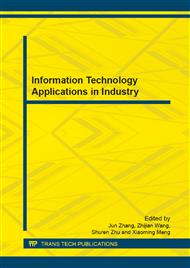[1]
KONG Weize; LIU Yiqun; ZHANG Min; MA Shaoping. Answer Quality Analysis on Community Question Answering. Journal of Chinese Information Processing, 2011,25(1):3-8.
Google Scholar
[2]
WANG Yu-Xiang QIAO Xiu-Quan LI Xiao-Feng MENG Luo-Ming. Research on Context-Awareness Mobile SNS Service Selection Mechanism. Chinese Journal of Computers, 2010,33(11):2126-2135.
DOI: 10.3724/sp.j.1016.2010.02126
Google Scholar
[3]
FANG Zhi-fei; LIN Hong-fei; YANG Zhi-hao; ZHAO Jing. Automatic Classification of Chinese Text Genre. Journal of Chinese Information Processing,2006,20(2):24-32.
Google Scholar
[4]
Benno Stein,Sven Meyer zu Eissen.Retrieval Models for Genre Classification.Journal of Information Systems,2008,20(1):93-119
Google Scholar
[5]
Kevin Crowston, Barbara H. Kwasnik. A Framework for Creating a Facetted Classification for Genres:Addressing Issues of Multidimensionality. Proceedings of the 37th Hawaii International Conference on System Sciences,2004,1-9
DOI: 10.1109/hicss.2004.1265268
Google Scholar
[6]
Luanne Silvia Freund. Exploiting task-document relations in support of information retrieval in the workplace. Doctoral dissertation. Faculty of Information Studies, University of Toronto. 2008.
Google Scholar
[7]
V. Vidulin, M. Luštrek, M. Gams. Using Genres to Improve Search Engines. Proceedings of the International Workshop "Towards Genre-Enabled Search Engines: The Impact of NLP". Borovets, Bulgaria. September, 2007.
Google Scholar
[8]
M. Swales, J. M.. Genre Analysis:English in Academic and Research Settings. Cambridge:Cambridge University Press,1990.
Google Scholar
[9]
Inger Askehave, M. Swales.Genre Identification and Comminicative Purpose:A Problem and a Possible Solution.Applied Linguistics,2001,22(2):195-212
DOI: 10.1093/applin/22.2.195
Google Scholar
[10]
W. J. Orlikowski, J. Yates. Genre repertoire: The structuring of communicative practices in organizations.Administrative Sciences,1994, 33(1): 541-574
DOI: 10.2307/2393771
Google Scholar
[11]
Mark A. Rosso. User-Based Identification of Web Genres. JOURNAL OF THE AMERICAN SOCIETY FOR INFORMATION SCIENCE AND TECHNOLOGY,2008,59(7):1053-1072.
DOI: 10.1002/asi.20798
Google Scholar
[12]
Inger Askehave,Anne Ellerup Nielsen. Digital genres: a challenge to traditional genre theory. Information Technology & People,2005,18(2):120-141
DOI: 10.1108/09593840510601504
Google Scholar
[13]
Marina Santini. Automatic Genre Identification:Towards a Flexible Classification Scheme. BCS IRSG Symposium: Proceedings of Future Directions in Information Access,2007.
Google Scholar
[14]
Marina Santini. Cross-Testing a Genre Classification Model for the Web. Text, Speech and Language Technology, 2011, 42(3):87-128
DOI: 10.1007/978-90-481-9178-9_5
Google Scholar
[15]
V. Vidulin, M. Luštrek, M. Gams. Using Genres to Improve Search Engines. Proceedings of the International Workshop "Towards Genre-Enabled Search Engines: The Impact of NLP". Borovets, Bulgaria. September, 2007.
Google Scholar
[16]
Mark A. Rosso. User-Based Identification of Web Genre. Journal of the American Society for Information Science and Technology,2008,59(7):1053-1072
Google Scholar
[17]
ZHU Li Yuan. Modern History of Western Aesthetics. ShangHai:Shanghai Literature and Art Publishing House,1993.
Google Scholar
[18]
XIN Bin. On a pragmatic approach to intertextuality. FOREIGN LANGUAGE RESEARCH, 2000,(3).
Google Scholar
[19]
Fowler,Roger.Language in the News:Discourse and Ideology in the Press.New York: Routledge,Chapman and Hall Inc.,1991.
Google Scholar


